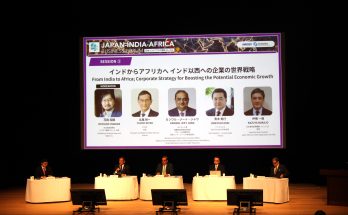It’s time not just for Africa, but African women to shine and prosper. With more women rising up the political and corporate ladder in the continent, Cherie Blair, the wife of the former British prime minister Cherie Blair, has struck an upbeat note, saying the 21st century belongs to African women.
“I have noticed since 2003 during my first visit to Nigeria that Nigerian women were a force to reckon with. The more I meet with Nigerian and African women, the more I become absolutely confident that the 21st century belongs to the African woman,” Blair said in the Nigerian capital Abuja. Blair was attending a meeting with Patience Jonathan, the spouse of Nigerian president Goodluck Jonathan. Blair was not just doing pep talk; the last decade has seen a surge in women empowerment across the continent. Not surprisingly, the African Union, the continent’s premier decision-making body, has declared 2010-2020 as the decade of women.
Africa currently boasts of two female heads of state: Liberia’s Ellen Johnson-Sirleaf and Malawi’s President Joyce Banda. The African Union Commission, the executive body of the 54-nation continent’s premier body, is headed by Nkosazana Dlamini-Zuma, a multi-faceted woman who has made a mark for herself in multiple roles before taking charge of this important position.
Another good news story which is unfolding in Africa, the hub of an economic resurgence in times of the slowdown, is the entry of more women into parliament. Rwanda, for example, has set new benchmarks: In Rwandan parliament, 56 per cent of legislators are women. In Senegal and South Africa, over 40 per cent legislators are women. According to estimates by the Inter-Parliamentary Union (IPU), an average 16.8 per cent of parliamentary seats are held by women in sub-Saharan Africa.
In Nigeria, Africa’s leading oil-producer, the petroleum ministry is headed by Diezani Alison-Madueke. In the newly-formed government of the Republic of South Sudan, there are five female ministers and nine deputy ministers. Currently, there are more than 95 female MPs in the recently reconstituted National Legislative Assembly, and five women in the newly formed Council of States.
It’s not politics alone where African women are making their presence felt. In areas of business and trade, success stories abound. South Africa’s Mamphele Ramphele, an anti-apartheid campaigner, has served as managing director of the World Bank. Evelyn Oputu is heading the Bank of Industry (BOI), Nigeria’s oldest development bank. Ory Okolloh, a Harvard-trained Kenyan-born activist, lawyer and blogger, currently serves as Google’s Policy Manager for Africa in Kenya. Zaamwani-Kamwi is a corporate heavyweight. She currently serves as Managing Director of Namdeb, a mining joint venture between the government of Namibia and De Beers. As the Chief Executive Officer of ArcelorMittal SA, Nyembezi-Heita leads the South African branch of the global steel manufacturer, the largest producer of steel in Africa, with an annual production capacity of 7.8 million tonnes.
Over the past two decades, African women have also been increasingly active in agriculture and sustainable development. Roughly 70% of small holder farmers in Africa are women and they are principal food producers. African women are proactively devising new strategies and mechanisms for upgrading agriculture practices. According to the United Nations Food and Agriculture Organization, over two thirds of all women in Africa are employed in the agricultural sector and produce nearly 90 percent of food on the continent. They are responsible for growing, selling, buying and preparing food for their families. In this context, the Food, Agriculture, and Natural Resources Policy Analysis Network (FANRPAN) is a pioneering initiative, which connects farmers, businesses, academia, researchers, donors, and national and regional governments.
The AU is doing its bit to spur the resurgence of women by setting up a fund for women, which includes 1 per cent of contributions made by member-states for the AU. The AU is also supporting 53 grassroots projects in 27 countries to advance the empowerment of women.




